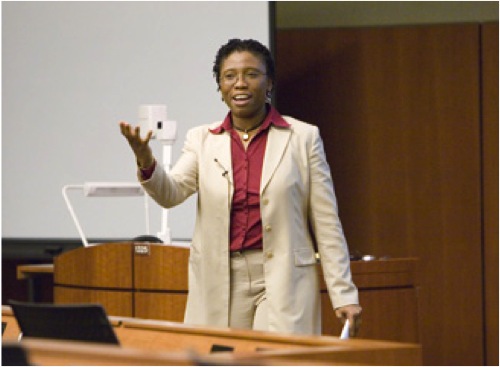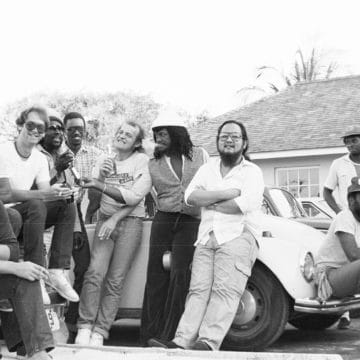Professor Guerda Nicolas on “Social Networks” and the Haitian Support System
By Alexander Britell
University of Miami Professor Guerda Nicolas’ new book, Social Networks and the Mental Health of Haitian Immigrants, takes a look at the mental and psychological issues Haitians face in entering new communities in the United States – and the kinds of community- and family-based systems which they use to cope. Nicolas, who came to UM from Boston College and is the chair of UM’s Educational and Psychological Studies department, talked to Caribbean Journal about the mental health issues that arise for Haitian immigrants, recommendations for dealing with them and surprising findings about Haitian communities in America.
Talk about what inspired you to write the book.
Most of my work in my career has been focused on Haitians. A lot of the work focusing on Haiti has been primarily negative – most of the time it took place as the HIV epidemic was spreading, and it affected people’s perspective on Haitians, and that hasn’t really changed much. In addition, all of the politics in Haiti, and the turmoil, has not really helped that. So most of what we know about Haitians [through research] was really negative – but really didn’t understand the other aspects of what it means to be Haitian, and the kind of support system they have and use regularly to help cope with a variety of different things. The purpose was to interview Haitians to get a sense of the kind of support system they use.
What were the most interesting findings from you research?
I think, being Haitian myself, I wasn’t surprised by how important family members were to Haitians, and how they talk about being connected to their families, no matter whether their families were here or not, and how frequently they were on the telephone with their families, and how important religion was to them as well. I think the most surprising thing was the sense of community, for the people I interviewed, because their experience in the US is different than in Haiti. Trying to establish a sense of a community connection wasn’t as prevalent here [in the US] as we had seen in Haiti. So some of the folks talk about not knowing their neighbours, and rarely utilizing their neighbours in the same way that Haitians use their neighbours in Haiti, for example, in terms of support. I was a little surprised – because they live in close proximity to other Haitians.
In the book, you make some recommendations about how to deal with and provide services for immigrants – what are they?
In the book, we ask people to really think about knowing about how important these types of supports are to people, and how to integrate them in the work, whether it’s in the school system working with kids, or in community centres working with families – how do we integrate these things. If you take something like family as an example, because we know how important it is in people’s lives, especially in Haitian people’s lives, how do we, as teachers or psychologists, think about ways we can integrate families more into the work we are doing with kids, the work we are doing with individuals. So for every chapter, there are some recommendations, and strategies, for how people can do that.
The book looks at mental health issues in adjusting to a new country. How much does that dynamic change for Haitians who experienced the earthquake and are now adjusting to a new country?
I don’t think it changes it much. Actually, the earthquake demonstrated how important those things are. So you think about how after the earthquake, people really came together [in South Florida] on a day-to-day basis to provide support for each other, and serve as a resource for one another – how often we all went to church. Every church was packed every day after the earthquake. So for me, the earthquake really demonstrated that these things we talked about in the book are really central in the lives of Haitians. We saw a demonstration of that – how people were impacted by what had happened to their family members in Haiti, how people were impacted by not being able to connect to their family members quickly. It showed that we cannot afford to not know about them, and cannot afford to not learn about them and how they impact people’s lives. There’s a really great example. After the earthquake, people were asking myself and a number of other Haitians, “how many people did you lose in the earthquake?” And some Haitians would say, “Well, I lost five people.” And they would respond, “Well, you’re really close to them, are they your family?” And [Haitians] found that very insensitive, because we don’t have this sense that some family members are more important to you than, say, your cousin. We don’t have the sense that you have first cousins or second cousins. If people find that they lost a family member, it means they lost people that were connected to them, whether or not they were related. And those losses were meaningful to them. So knowing that, which is what we talk about in the book, it enables you not to ask those questions, because you recognize how important all of the family members are to people. It’s the same thing – when people say, how many people did you lose? We say, “we lost 300,000 people,” because of our sense of what it means to be connected – by culture, by history and by the sense of community.”
You’ve worked with aid providers in Haiti on these kinds of issues. Can you talk more about that?
We’ve been doing some work in Haiti for the last 15 years. We’ve been doing community health work, primarily thinking about how we integrate mental health in the community as well as in primary care. So far, in the last year since the earthquake, that [work] really increased for us, so we’re doing a number of projects, both in the north and south of Haiti. For example, we have a partnership with the University of Miami School of Nursing, where we’re training 100 physicians and 100 nurses about understanding the health issues, because they’re more likely to speak to clients. So we want them to understand that when they see a particular client, and there are no medical explanations for their issues, they may be depressed, or anxious. There may be a number of mental health issues contributing to their physical pain, and it’s really important to understand them, and know how to refer them to appropriate services. That’s the work we’ve been doing for the last year.
How much has the sense of community between the diaspora community and the Haitian community changed or been strengthened since the earthquake?
After the earthquake, I was new here from Boston, and I got connected to a whole lot more Haitians as a result of the earthquake. And to the point that we actually now have Haitian mental health networks that are everywhere – there’s one in Boston, there’s one in New York and we have one here [in Miami]. I think we now have a platform which can really help us have an ongoing dialogue and conversation with each other. So it’s been really great to see the way that this disaster has really brought us together, to really think about the future – for Haiti, as well as for Haitian people in the diaspora.







